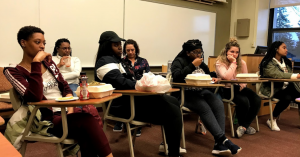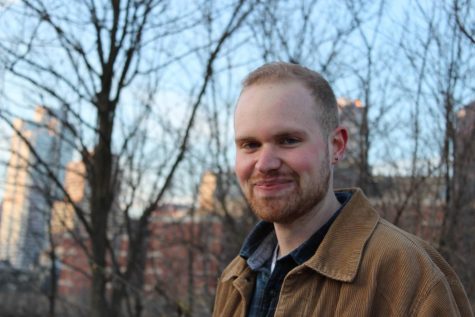IDEAS Center hosts open dialogue about n-word and campus racism

Students listen to an open discussion about racism and the use of the n-word on Allegheny’s campus. The discussion was hosted by the IDEAS Center and the Office of Residence Life on April 2, 2019.
About 20 students and faculty members attended a discussion regarding the n-word and racism on Allegheny’s campus to share their views on the issue as well as potential solutions to the problem.
The Inclusion, Diversity, Equity, Access and Social Justice Center and the Office of Residence Life hosted a discussion, “When I Hear the N-Word,” on Tuesday, April 2, at 7 p.m. in room 126 in Quigley Hall. The open dialogue was led by justin adkins, associate dean, director of the IDEAS Center.
adkins opened the discussion by noting several requests for a chance to talk about the issue of racism, specifically the usage of the n-word.
“I grew up in a community where white kids didn’t say the n-word at all,” adkins said, “but then, older people in my family did use the word every once in a while. Growing up, I learned to say something to them about it.”
adkins said he was shocked about the usage of the word in conversations with several students over the past few years, and that this sparked the idea for a dialogue. The discussion was then opened to students to share their experiences.
Briana Watson, ’19, shared an experience from her first year when she was walking in downtown Meadville with a friend. A black pickup truck sped by and someone shouted the n-word at her.
“It’s happened many times on campus as well,” Watson said. “They sing songs at parties. It’s a recurring thing on campus, which is really annoying.”
Breanna Blair, ’19, said she came to the discussion to learn more about the topic.
“Whose word is it? Blair asked. “Should people be allowed to say it in songs? I don’t say (the n-word) ever in songs.”
That sentiment was echoed by Angelica Perez-Johnston, associate director of the IDEAS Center.
“I think it’s interesting that (Blair) brought up ‘whose word is it to say,’ because that’s probably the biggest question,” Perez-Johnston said.“Especially on a predominantly white campus: Who can say it and who can’t say it? I will be perfectly clear, now, in saying that no white person on the face of the planet should ever say it for any reason. If you take anything away from this conversation, that should be the one thing that’s taken away.”
Blair noted that an Asian co-worker once said any minority could use the word and wondered whether that was appropriate.
“In my opinion,it doesn’t matter if you’re a minority,” Watson said. “If you’re not black, you should not be using that word, period. Even though you’ve still gone through different struggles, that word is not for you, it was not used against you. Even if you’re Asian or Hispanic, that’s not your word.”
Perez-Johnston asked the group to expand on the context, why the word is not appropriate for non-black people to use.
“It wasn’t used against you,” Watson said. “During enslavement and even in the civil rights era and post-(civil rights era), (the word) wasn’t used for you. This was used against us and we took it back and made it our word. You were not called that word. You’re still not called that word. So, you shouldn’t be using that word.”
Sydney Francis, ’21, agreed with Watson, adding that the word isn’t always used maliciously, but that doesn’t make it any less degrading.
“One thing that really bothers me about the word is that most of the time, people don’t use it maliciously, and they feel excluded and (wonder) why they can’t be a part of it,” Francis said. “Having that word be used against you as a tool … if somebody used that word against me it means ‘your life doesn’t matter to me. You could die right now and it wouldn’t matter. Your mother’s tears don’t matter to me.’ It carries a lot of weight, and if you’re not the person carrying that weight on your back, then you don’t get to say the word.”
Naomy Garcia, ’19, said that the n-word hurts her personally.
“The word still affects us, black people, today, and that’s also why I don’t like people using it,” Garcia said. “It has so much history and so much background that still carries on and affects me every day. Every single day that I step out as a black woman in this country, that word affects me. For people to even use it as a joking manner or in a song, that hurts me. Me, personally, that hurts me.”
One question arose about whether the word carries a similar negative meaning when black people use it. Garcia said that she has personally debated this question.
“I feel like, now, whenever I hear the word being used amongst the black community, it’s more of a sense of brotherhood, sisterhood and love,” Garcia said.
adkins asked how white people can collectively start changing the behavior of using the word. Watson said that this conversation gets tiring and that white people can educate others as to why the word is not appropriate to use.
“That’s where white allies step in,” Watson said. “It’s your job to correct people to not say that word.”
Perez-Johnston said white people may become uncomfortable to be confronted or to be called out for saying an inappropriate word.
“But the thing that white folks have to realize is that our students of color don’t have a choice of the discomfort of being in their own skin,” Perez-Johnston said. “And they have to live that every day, so, your five minutes of discomfort … is a lifetime for us.”
The discussion transitioned into how the campus community can be educated about the word’s nature without putting the burden on black students. Some people suggested more posters such as diversity posters that are found in some residence halls. adkins asked whether the Allegheny Orientation Common Reading books were helpful, as they discuss racial diversity. Several students noted too little time was spent discussing the books.
“You read it over the summer, you meet one time with a random group of people, and you never talk about it again,” Francis said. “If you don’t read it, there are no consequences.”
adkins reported that there was over 90 percent participation in the 2018 Common Reading, “Between the World and Me” by Ta-Nehisi Coates. The Common Reading experience also now includes a panel discussion and a meeting with students’ FS classes. adkins said that some FS professors will use the reading this fall in their courses and that the goal is for the book to be a component of all FS courses by the 2020-21 academic year.
“But, y’all are saying we need something more,” adkins said.
Blair suggested a combination of the Common Reading and a course similar to the sexual assault bystander training that Women’s Services offers to students to help educate people about diversity and inclusion. adkins said that there are now summer modules that cover sexual assault, alcohol and diversity. Some students suggested that the courses are a “one and done” thing that are forgotten quickly after completing.
Many students in the dialogue appreciated the opportunity to share their experiences, concerns and questions about the issue.
“I really liked this discussion,” Blair said. “And now, being able to stand up to friends, I have amazing things to say to them about why (to not use the n-word). But, this (discussion) is voluntary, and the people who probably need it the most aren’t the people who are going to show up.”
Both students and faculty expressed hope that conversations and educating people about racism can lead to change.
“I’m a Mexican-American,” Perez-Johnston said, “and I have a meme on my door that says ‘Oh, you’re Mexican? Then, why do you look white?’ I’ve been challenged on this campus on numerous occasions by students that don’t know any better and feel as though they can challenge everybody and their identity. It’s a meme and a conversation starter. People do ask questions because it’s a humorous way to begin a conversation.”

Ethan Woodfill is a senior from Pittsburgh, Pennsylvania. He is an Environmental Science & Sustainability and Political Science double major with an...







